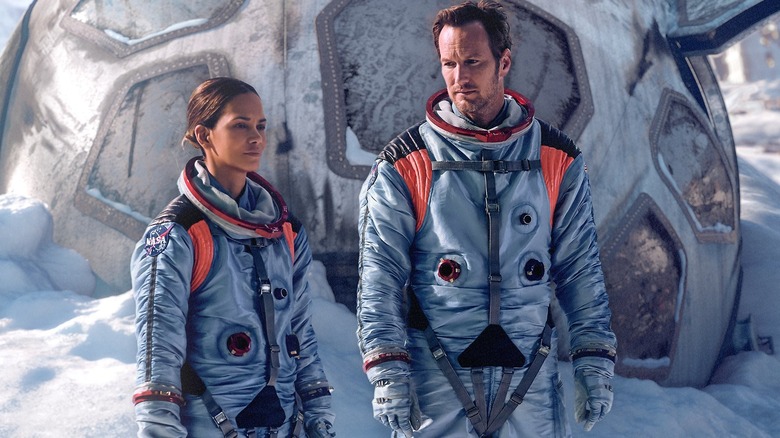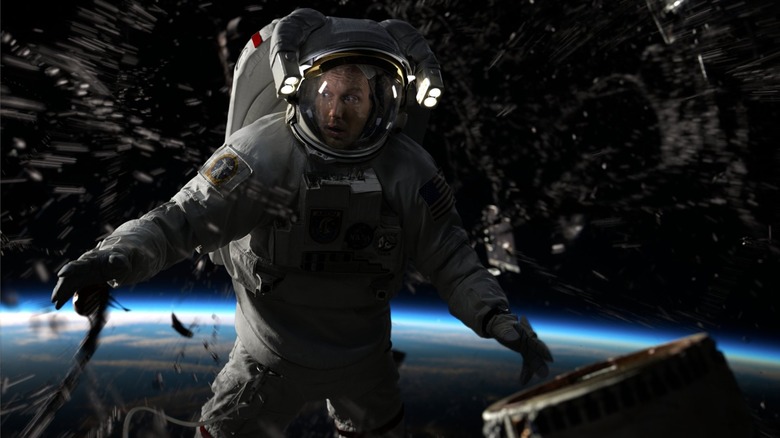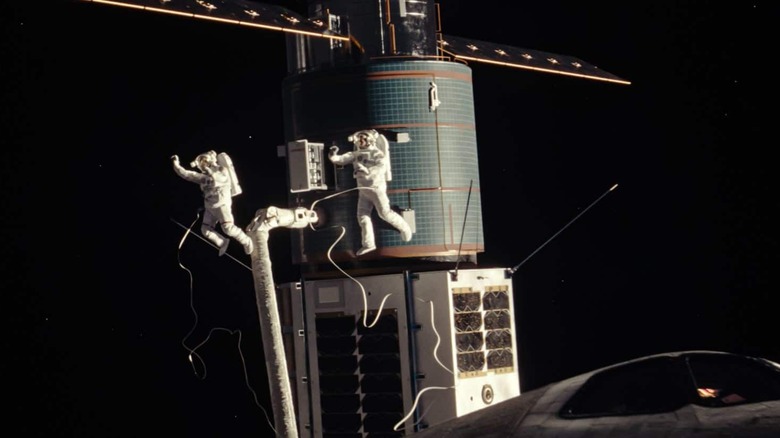Roland Emmerich Had To Resort To Plan B For Moonfall's Zero-Gravity Acting Classes
Roland Emmerich's "Moonfall," released in theaters back in February, is an incredibly stupid film. That statement is not meant as a value judgment, but a mere descriptor. It could even be construed as a compliment. As overwrought, visually busy, dunderheaded disaster blockbusters go, they don't get much more unabashedly fatuous as "Moonfall." It's a film that offers synergistic enhancement to alcohol. Its dumb ideas are, if one is honest, strangely fun and appealing. "Moonfall" would make a great double feature with "Geostorm." Which was, incidentally, made by Dean Devlin, Roland Emmerich's longtime writing partner.
The premise of "Moonfall" is simple. Earth's moon is falling from its orbit, causing flooding and weird gravitational anomalies all over the world. Patrick Wilson, Halle Berry, and John Bradley find, through a very elaborate investigation process, that the moon is not a heavenly body that formed naturally, but an ancient alien superstructure housing a swarm of tiny malevolent space bots. It turns out that billions of years ago, human-like alien ancestors living on a distant planet had accidentally created a resentful AI program that turned on it. The moon was built on said distant planet as a seeding craft to implant the Earth with human DNA. It is, as they say, a hoot.
Much of the action sequences in "Moonfall" center on the shifting of gravity. Not only are several scenes set aboard space shuttles or on the lunar surface, but as the moon passes closer and closer to Earth, its gravity begins lifting people — and buildings — off the ground. In a recent behind-the-scenes report from SciFiNow, the cast talked about what they had to do to ensure authenticity in their zero-gravity movements, and the trials of shooting a film during a pandemic.
Moonfall in the time of COVID-19
Shooting "Moonfall" was, it seems, an arduous process. Keeping actors isolated from one another meant for a drastically reworked shooting schedule which reduced the original 70-day shoot to a mere 61 days. For a film of this size — "Moonfall" cost about $150 million — 61 days is quite a short time indeed. "Moonfall" needed to be separated into "splinter units," allowing smaller crews to work separately. The units would all be overseen by Emmerich. The separate units didn't always have the same cast members together at the same time. Halle Berry confirmed this, saying "We were very isolated from one another, that was a challenge," but that she was grateful she was able to work when so many productions had been shut down because of COVID-19 concerns.
Both Berry and Wilson play astronauts in "Moonfall," and Wilson revealed that he had a plan to go to NASA and enroll in zero-gravity training with actual astronauts, and take advantage of the organization's many space-experience simulators. He wanted his movements and his experience to be accurate. Sadly, the pandemic put the kibosh on that, so Wilson had to rely on — just like the rest of us — having meetings via Zoom calls. Wilson's zero-G training almost all had to come from video screens. Said Wilson:
"[We] relied on meetings with astronauts ... then just watching videos that they showed us. They gave us access to the International Space Station so just watching how everyone moves, the things that you have to do in close quarters."
Bjarni Tryggvason
Luckily, it wasn't 100% video meetings for the cast. The Canadian engineer Bjarni Tryggvason was hired to come to the set and consult. Tryggvason, at 76, was an experienced pilot and astronaut who once spent a 12-day mission in orbit, and who had logged 4,000 hours of flight experience. The astronaut visited the "Moonfall" set in Montreal to consult and make sure that the actors knew what they were doing. A silly story like "Moonfall," which strays very, very, very, very far from scientific authenticity, most assuredly needs small details like space travel correct if the story is to be read at all. Wilson understood that amateurish space movements would be distracting. "[Y]ou want to make it look like this is not your first time," Wilson said.
Tryggvason passed away on April 5, 2022, which allowed him to see the final cut of "Moonfall," which had been released in February. He is not on record with his opinion on the movie. One can say, though, that Wilson and Berry did give it the old college try. Despite the implausibility and silliness of the premise, Wilson and Berry are professional enough to anchor the film and read as palpably human. Well, as human as the larger-than-life characters in Roland Emmerich films tend to be.
"Moonfall" was not well-received by audiences, having lost about $139 million at the box office. At last count, it's the 25th biggest box office bomb of all time. It's a pity it didn't succeed, as Emmerich was already planning a pair of mega-sequels. According to a report in the Hollywood Reporter, Emmerich's sequels would have been even nuttier than the original.


